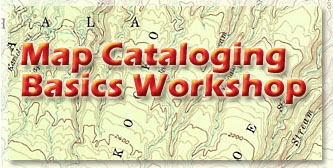9:00 a.m.-9:30
|
Introductions
- Workshop Introductions
- Maps and Cartographic Resources: Description of the format and related items
- How to read a map
- Map Features and Types (i.e., topographic, planimetric, etc.)
|
9:30-10:00
|
Cataloging: Description
- How to read a map for description
- Physical data sources, measuring, parts of a map, useful elements to describe
- Translating English to MARC
- Author, Title, Statement of Responsibility, Edition, Series, Added titles, etc.
- Important features of the map not covered in
author/title/responsibility statements
- Physical Attributes (no. of pieces, color, type of map, dimensions, accompanying materials)
|
10:00-10:30
|
Cataloging: Description 2
- Mathematical data (Scale, Projection, Coordinates)
- Map Scale determination (when not apparent)
- Map Projection Basics
- Coordinates and Alternate Systems
|
10:30-10:45
|
Break |
10:45-12:00 p.m.
|
Cataloging: Description 3
- Descriptive Notes
- Order of Note Fields (LC Manual)
- Quoted notes / Creation notes / Languages / Physical features represented (e.g., contours) / Numerical and other elements / Verso description / Insets, Ancillary Maps, Legends, Index and other elements
|
12:00-1:00
|
Lunch |
1:00-2:30
|
Cataloging: Subject Analysis
- Library of Congress Subject Headings
- Subdivisions / Free-Floaters
- Call Numbers
- LC Call Numbers
- Call Numbers for maps in series
- SuDoc numbers
- Geo-code variable fields
|
2:30-2:45
|
Break |
2:45-3:30 |
Other
- Problems in Map Cataloging
- Searching for Records (OCLC, other)
- Two maps on one sheet
- One map on multiple sheets
- Maps accompanying books
- Undated maps (determining date/range)
- Atlases
- Elements
- difference from “Books” format
- LC Call Numbers
|
3:30-5:00 |
Review–Specific Topics
- Summary
- Developing Map-Cat Tools (i.e., Personal, Online, etc.)
- Where else to go for assistance
- Questions, Comments...
|
|
Process for Cataloging Maps
- Read map data to determine form and content
- Describe the physical map and interpret this description into MARC format
- Create notes
- Formulate LC call numbers
- Create subject headings and subdivisions
- Find map and geographical information (both print and online resources)
- Develop resources to assist with map cataloging (both published tools and personal ones).
Workshop Goals
This workshop is intended to provide basic to
intermediate instruction on cataloging maps and cartographic materials.
By use of examples and discussion, attendees will be able to catalog such
items. At the end of the workshop, participants will:
- learn about the MARC maps format and what
items are included
- learn procedures for cataloging maps, including how to:
- read map data to determine its form and content
- describe the physical map and interpret this description into MARC
format
- create notes
- formulate LC call numbers
- create subject headings and subdivisions
- find map and geographical information (both print and online resources)
- develop resources to assist with map cataloging (both published
tools and personal ones).
This workshop will also be useful for librarians
who need to handle map and geography reference questions.
Through the use of examples and short exercises
with real maps, participants will be able to practice and develop a feel
for what is needed to produce catalog records. Examples will include both
common and unusual pieces, which will be matched to catalog records to
help visualize the creation of the records.
Materials covered in the workshop will include
the key tools, such as AACR2, Cataloging Service Bulletins, LC Schedule
G, LC Subject Headings, LC Map Cataloging Manual, and others. Participants
will also be shown resources developed by associations of map librarians,
and resources developed by the instructor to assist in map cataloging.
Participants may wish to bring a map (either unique or common) that
can be cataloged on-site. The instructor will bring examples and
the corresponding catalog records along with various tools used to catalog.
Useful tools: ruler, Metric tape measure, pencils, scrap paper, worksheets. |
Additional References
|
 |
David J. Bertuca, Map Librarian, University at Buffalo.
Last Modified: 19 May 2010
URL: http://www.DavidBertuca.net/maps/cat/map-cataloging-workshop-becpl.html
Comments Welcome
Back to: Map
Cataloger's Tool Box
Back to: Cataloging
Resources
The materials
selected above do not necessarily reflect the procedures and practices
of the State University of New York at Buffalo. |
